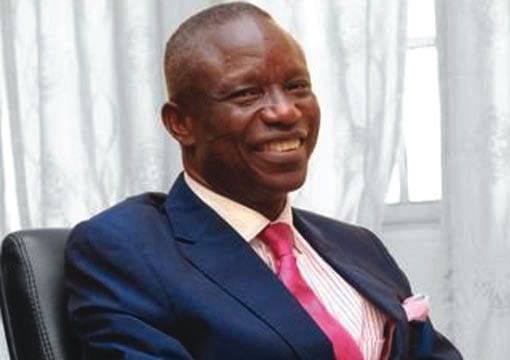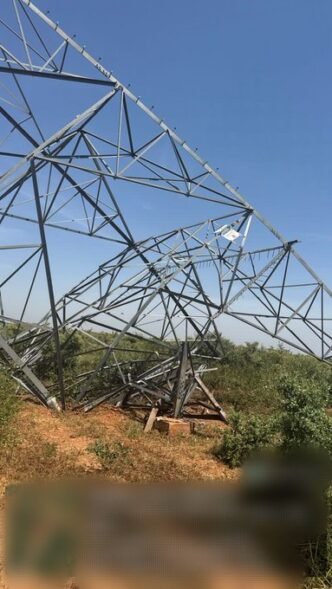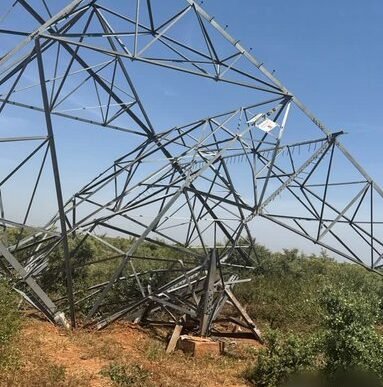Abuja, Nigeria — October 23, 2025:
In a landmark move toward strengthening Nigeria’s internal security and reducing dependence on foreign technology, the Department of State Services (DSS) and the National Agency for Science and Engineering Infrastructure (NASENI) have announced the commencement of local production of high-tech security equipment within the country.
The initiative, jointly unveiled on Thursday in Abuja, marks a new phase in Nigeria’s security and technology collaboration drive, as both agencies aim to develop advanced surveillance systems, communication tools, drones, and counter-intelligence devices tailored to the nation’s unique security challenges.
According to a statement issued by NASENI’s Director of Information, Mr. Segun Ayeoyenikan, the partnership between the DSS and NASENI represents a bold step in actualizing President Bola Ahmed Tinubu’s administration’s goal of achieving technological self-reliance, national security modernization, and industrial growth.
Strengthening Nigeria’s Security Architecture
The DSS–NASENI collaboration seeks to domesticate the research, design, and production of security and defense technologies that have traditionally been imported at high costs.
The initiative aligns with the Federal Government’s broader security reform plan aimed at equipping law enforcement and intelligence agencies with locally developed, cutting-edge tools to combat terrorism, banditry, kidnapping, cybercrime, and other emerging threats.
Speaking during the launch ceremony at the NASENI headquarters in Abuja, Executive Vice Chairman and Chief Executive Officer of NASENI, Mr. Khalil Suleiman Halilu, said the agency’s research and development (R&D) capacity would now be directed toward the creation of “made-in-Nigeria” solutions that meet the operational needs of the DSS and other security services.
“This collaboration represents a milestone in our national quest for homegrown technology. We are working with the DSS to ensure that Nigeria not only secures itself but also builds the technological backbone needed for sustained security innovation,” Halilu stated.
He explained that NASENI’s engineers, in partnership with DSS technical experts, would focus on producing surveillance drones, tactical communication systems, armored vehicle components, and data encryption devices—all designed and manufactured locally.
DSS Emphasizes Self-Reliance and Innovation
The Director-General of the DSS, Mr. Yusuf Magaji Bichi, reaffirmed the Service’s commitment to fostering innovation and reducing dependence on foreign security technologies.
According to him, Nigeria must build its capacity to develop and maintain its own security equipment if it hopes to achieve lasting peace and resilience in the face of evolving threats.
“We cannot continue to rely on foreign suppliers for technologies that are critical to our national defense and intelligence operations,” Bichi declared. “Through this partnership with NASENI, we are building the foundation for a self-reliant, innovative, and sustainable security infrastructure that meets our unique national needs.”
He further noted that the project would enhance coordination among security agencies and improve the DSS’s ability to detect, prevent, and neutralize threats in real time through the use of smart surveillance and artificial intelligence-driven monitoring systems.
Technology Meets Security: A Strategic Shift
The collaboration between the DSS and NASENI represents a fusion of science, technology, and intelligence—a combination experts say is crucial for 21st-century national defense.
For years, Nigeria has depended heavily on imported security technologies, from drones and surveillance cameras to armored vehicles and cyber-defense tools. This dependence has often left the nation vulnerable due to high costs, maintenance challenges, and limited local technical know-how.
Security analysts have hailed the partnership as a turning point for Nigeria’s security sector.
Dr. Hassan Usman, a security and defense technology expert, told reporters that the development would not only boost the country’s technological ecosystem but also create employment and build local capacity.
“This is a smart move. When your intelligence agency collaborates with your engineering and innovation agency, you create a synergy that can transform both your security architecture and your industrial base,” Dr. Usman said. “Nigeria has the brains, the talent, and now the political will to make it happen.”
Boosting Local Content and Industrial Development
NASENI, established in 1992, is Nigeria’s apex body for engineering research and technological innovation. Under Mr. Khalil Halilu’s leadership, the agency has expanded its focus to include local production of drones, solar panels, lithium batteries, electric vehicle components, and agricultural machinery.
The DSS–NASENI partnership is expected to open up opportunities for Nigerian scientists, engineers, and entrepreneurs to participate in the production of security technologies, contributing to the government’s local content development policy.
The move also supports President Tinubu’s Renewed Hope Agenda, which prioritizes innovation, job creation, and technology transfer.
Industry observers believe the initiative could reduce Nigeria’s security import bill by billions of naira annually while enhancing the country’s ability to customize tools that address its specific terrain and operational realities.
Economic and Strategic Implications
Beyond the immediate security gains, the local production of high-tech equipment has wider economic implications. It is expected to stimulate Nigeria’s manufacturing base, improve the country’s balance of payments, and foster public-private partnerships in the defense technology sector.
The collaboration also positions Nigeria as a potential regional hub for security technology in West Africa, providing opportunities for export and cross-border collaboration.
Economist and policy analyst, Dr. Grace Adediran, said the initiative could have ripple effects across multiple sectors.
“What the DSS and NASENI are doing is more than just producing gadgets—it’s about creating a new industrial ecosystem,” she noted. “By investing in local research, production, and human capital, Nigeria can begin to reduce its dependence on foreign suppliers and become a producer of security technology rather than a consumer.”
Empowering Nigeria’s Youth and Innovators
Another major component of the project involves the engagement of Nigerian youths and innovators in technology incubation and prototyping.
NASENI announced that it would work with universities, research institutions, and tech hubs to identify young Nigerian engineers and developers with creative ideas that can be adapted for national security use.
This initiative is expected to boost employment, inspire innovation, and provide mentorship opportunities for the next generation of scientists and security technologists.
“We are creating a platform for Nigerian youths to contribute meaningfully to the safety and stability of their nation,” Halilu emphasized. “Security is no longer just about guns and uniforms—it’s about data, intelligence, and technology.”
Next Steps and Implementation Timeline
Both agencies disclosed that pilot production of the first set of security gadgets—comprising surveillance drones, signal jammers, and portable communication devices—would begin before the end of 2025. The equipment will be tested and deployed in strategic security operations once they pass operational validation.
Additionally, NASENI and the DSS plan to establish a National Security Technology Innovation Hub in Abuja, where research, testing, and development will be jointly conducted. The hub will also train security personnel in the use and maintenance of advanced locally produced equipment.
A New Era for Nigeria’s Security Infrastructure
The launch of local high-tech security equipment production marks a significant stride in Nigeria’s long-standing effort to strengthen its defense sector through homegrown innovation.
Observers agree that while the road ahead will require sustained investment, political will, and coordination among agencies, the partnership between DSS and NASENI signals a promising shift toward national self-sufficiency in technology and intelligence operations.
As Nigeria continues to face complex security challenges—from terrorism in the North-East to organized crime and cyber threats—the ability to design and produce its own security tools could become one of the country’s most powerful strategic advantages.














